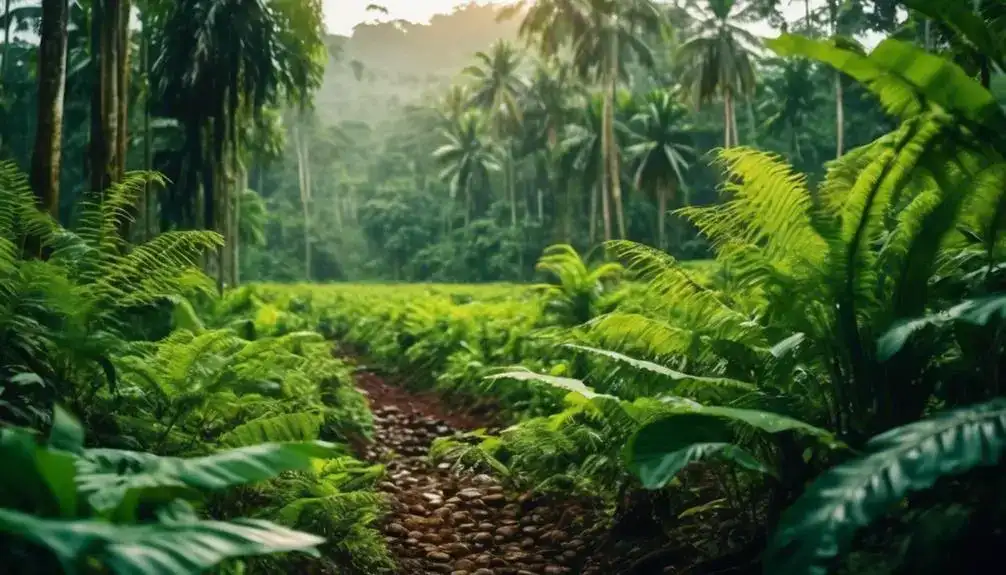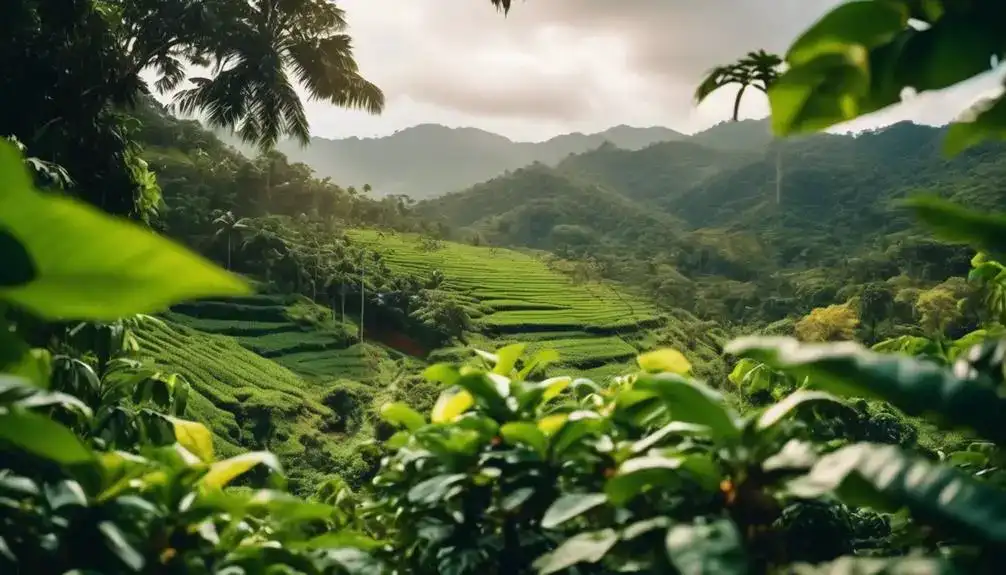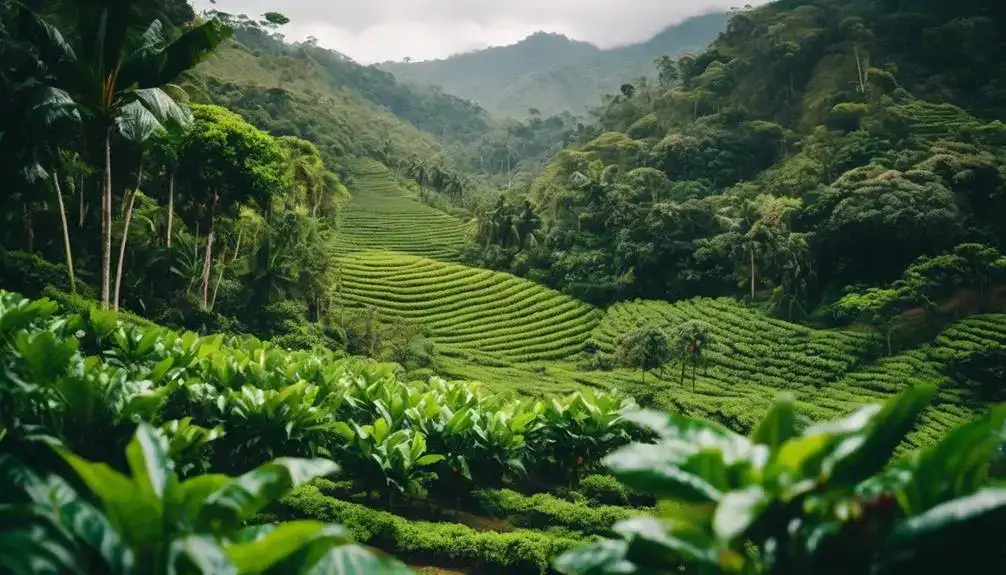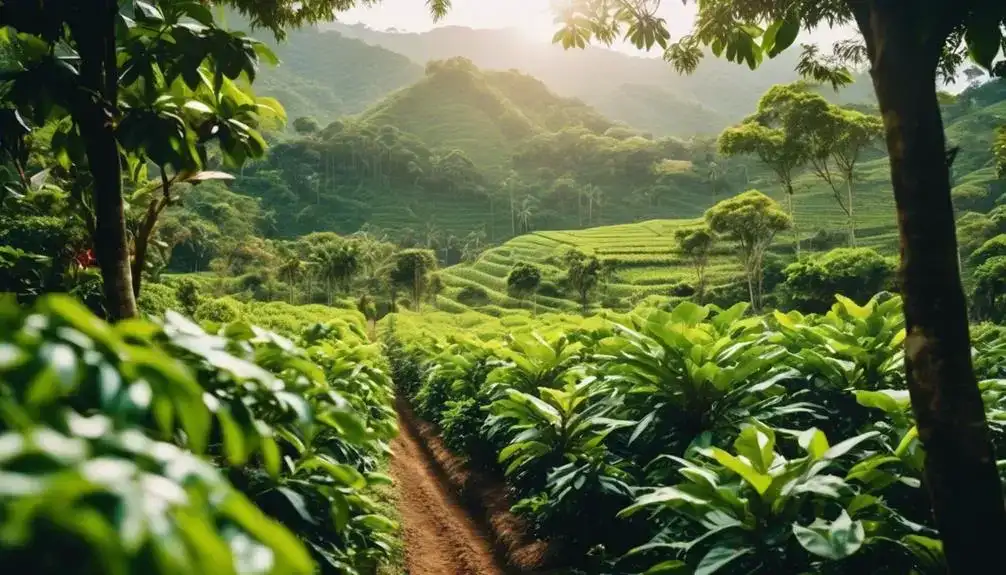When you savor that first sip of your morning cup of excelsa coffee, do you ever stop to think about the impact your favorite brew might be having on the planet?
Shocking facts have surfaced about the environmental consequences of traditional excelsa farming methods, and it's time to consider whether your daily indulgence is contributing to the problem.
As our understanding of sustainable farming practices expands, there's a growing need to explore the benefits of planet-friendly excelsa farming and the techniques that can help mitigate its potential harm.
The future of excelsa farming holds promising possibilities, but it's essential to consider the current reality and the steps that can be taken to ensure that your beloved cup of excelsa coffee is not harming the planet.
The Impact of Excelsa Farming

Some people may not realize the environmental impact of Excelsa farming, but it plays a significant role in shaping the health of our planet. Excelsa farming can lead to soil degradation, which negatively affects the land's ability to support healthy crops and ecosystems. This degradation occurs due to the intensive cultivation practices often associated with Excelsa farming, such as excessive tilling and the use of chemical fertilizers. As a result, the soil loses its natural fertility and resilience, making it more susceptible to erosion and nutrient depletion.
Furthermore, Excelsa farming also has implications for climate change adaptation. The clearing of land for Excelsa farming can contribute to deforestation, reducing the number of trees that play a crucial role in sequestering carbon dioxide from the atmosphere. Additionally, the use of certain farming practices and chemicals in Excelsa cultivation can release greenhouse gases, further exacerbating climate change.
Innovative approaches to Excelsa farming, such as agroforestry and organic farming methods, can help mitigate these environmental impacts. By implementing sustainable practices, farmers can reduce soil degradation, preserve biodiversity, and contribute to climate change adaptation, ultimately promoting a healthier planet for future generations.
Environmental Consequences of Traditional Methods
Traditional Excelsa farming methods have been linked to significant environmental consequences, particularly in terms of soil degradation and deforestation. The reliance on conventional farming practices has led to a decline in soil fertility, erosion, and loss of biodiversity.
Furthermore, the expansion of Excelsa farming has resulted in widespread deforestation, contributing to habitat destruction and loss of carbon sinks. However, in response to these environmental impacts, the adoption of sustainable practices is paramount.
By integrating innovative and sustainable techniques such as agroforestry, organic fertilization, and precision agriculture, Excelsa farming can mitigate its environmental impact. Sustainable practices not only promote soil health and biodiversity but also reduce the carbon footprint of Excelsa farming.
Embracing these environmentally friendly methods is crucial for the future of Excelsa farming, ensuring its long-term viability while minimizing harm to the planet. As the demand for sustainable products continues to rise, incorporating eco-friendly practices isn't only an ethical choice but also a strategic one for the longevity and success of Excelsa farming.
Benefits of Sustainable Excelsa Farming

Adopting sustainable farming practices in Excelsa cultivation yields numerous benefits for both the environment and the long-term success of your farm. By embracing sustainable methods, you can enjoy the following advantages:
- Agroforestry Benefits: Integrating Excelsa coffee trees with other vegetation creates a diverse and resilient ecosystem. This approach enhances soil health, reduces erosion, and provides habitats for beneficial insects and wildlife.
- Ecological Advantages: Sustainable Excelsa farming minimizes the use of harmful chemicals, preserving the natural balance of the environment. This leads to improved water quality, reduced pollution, and enhanced biodiversity in your farm.
- Long-Term Soil Fertility: Sustainable farming practices such as composting and mulching help maintain soil fertility over time, ensuring the continued productivity of your Excelsa coffee trees.
- Climate Resilience: Sustainable Excelsa farming techniques contribute to climate change mitigation by sequestering carbon in the soil and vegetation, making your farm more resilient to extreme weather events.
Soil and Water Conservation Techniques
You'll learn about erosion control methods and sustainable irrigation practices in this section.
These techniques are essential for maintaining the health of the soil and conserving water resources.
Erosion Control Methods
To effectively protect the soil and water from erosion, implementing proven conservation techniques is crucial. Here are four innovative methods to control erosion on your Excelsa farm:
- Terracing Techniques: Utilize cutting-edge terracing methods to create level areas on your slopes, minimizing soil erosion and retaining water effectively.
- Cover Crops: Embrace the latest cover cropping techniques to safeguard your soil from erosion, improve soil structure, and enhance organic matter content.
- Bioengineering: Explore modern bioengineering solutions such as using live plant materials to stabilize soil and prevent erosion in sensitive areas.
- Mulching: Adopt advanced mulching practices using biodegradable materials to protect the soil surface, reduce water runoff, and promote soil moisture retention.
Sustainable Irrigation Practices
Implementing sustainable irrigation practices is essential for maintaining the soil and water conservation techniques discussed in the previous section on erosion control methods.
Drip irrigation, a key sustainable practice, conserves water by delivering it directly to the roots of plants, minimizing evaporation and runoff. This method not only optimizes water usage but also promotes healthier plant growth.
Additionally, integrating renewable energy sources, such as solar-powered irrigation systems, further contributes to sustainable practices. By harnessing solar energy to power irrigation systems, farmers can reduce their reliance on non-renewable energy sources and minimize their environmental impact.
Embracing these innovative techniques not only supports water conservation but also aligns with the increasing demand for sustainable farming practices.
It's time to revolutionize your irrigation methods and contribute to a healthier planet.
Biodiversity Preservation in Excelsa Farms

Preserving biodiversity in Excelsa farms is essential for maintaining a healthy and sustainable agricultural ecosystem. By implementing innovative practices, you can actively contribute to the preservation of wildlife and the restoration of natural habitats on your farm. Here are four key ways to promote biodiversity preservation in your Excelsa farm:
- Wildlife Conservation: Embrace shade-grown coffee cultivation to provide a conducive environment for diverse wildlife species, fostering a balanced ecosystem within your farm.
- Agroforestry: Incorporate agroforestry techniques to create a biodiverse landscape, where different plant species coexist, providing habitats for various animals and insects.
- Habitat Restoration: Integrate habitat restoration initiatives by preserving natural areas within your farm, allowing native flora and fauna to thrive and maintain ecological balance.
- Eco-friendly Practices: Implement sustainable and eco-friendly farming practices that minimize negative impacts on the environment, supporting the preservation of biodiversity.
Carbon Footprint of Excelsa Coffee Production
Minimize the environmental impact of Excelsa coffee production by analyzing and reducing its carbon footprint through sustainable farming practices. The carbon footprint of coffee production, especially in the case of Excelsa variety, plays a significant role in contributing to climate change. By implementing innovative and sustainable agricultural practices, it is possible to mitigate the carbon footprint associated with Excelsa coffee farming.
| Carbon Footprint Components | Mitigation Strategies |
|---|---|
| Energy Use in Farming Operations | Implementing renewable energy sources such as solar panels. |
| Transportation of Coffee Beans | Utilizing more fuel-efficient vehicles and optimizing transportation routes. |
| Processing and Packaging | Implementing eco-friendly processing methods and biodegradable packaging materials. |
The Future of Planet-Friendly Excelsa Farming

How can Excelsa coffee farming adapt to become more environmentally sustainable for the future?
Climate adaptation and agroforestry techniques offer promising solutions for the future of planet-friendly Excelsa farming. Here are four innovative approaches to consider:
- Climate-Resilient Cultivars: Developing and cultivating Excelsa coffee varieties that are more resistant to climate change effects, such as drought and temperature fluctuations, can help ensure sustained production in the face of environmental challenges.
- Agroforestry Integration: Implementing agroforestry systems, which involve growing coffee alongside trees and other crops, can enhance biodiversity, improve soil health, and provide natural shade for the coffee plants, reducing the need for artificial inputs.
- Precision Agriculture Technologies: Embracing advanced technologies like remote sensing, drones, and data analytics can enable farmers to optimize resource use, monitor plant health, and make data-driven decisions for efficient and sustainable Excelsa coffee cultivation.
- Carbon-Neutral Practices: Implementing carbon-neutral practices, such as composting, mulching, and reducing chemical inputs, can help minimize the carbon footprint of Excelsa coffee farming, contributing to a more sustainable future for the industry.
Conclusion
So, next time you reach for that cup of excelsa coffee, think about the impact of your choice.
By supporting sustainable farming practices, you can help ensure that the planet-friendly future of excelsa farming continues to bloom like a vibrant garden.
Let's all do our part to preserve the earth, one delicious cup of coffee at a time.






